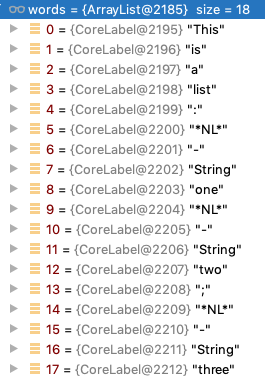As far as I can tell, what you are trying to do is not the intended use of boundaryMultiTokenRegex. The documentation says
"The matched tokens will be treated as not part of the following sentence."
My understanding is, this means the matched tokens will be part of the first sentence. In other words, the behavior you are seeing is exactly the expected behavior.
What you could possibly do is add functionality to the WordToSentenceProcessor which includes a lookahead tokenregex. Alternatively, you could add a new annotator between ssplit and the other annotators which rearranges the sentences as needed. Although I might be missing something, I don't see any functionality that does exactly what you need right now.
Hello, I'm trying to split a list of sentences without a proper punctuation into separate sentences. And looks, an expression written in
boundaryMultiTokenRegexis not working as expected. The key aspect here, I cannot split all the text by new line in all the cases because whole text might be with multi line sentences. But list items are with a key indicator of the start.Expected behavior is to get 4 sentences:
Real behavior:
Additional findings: I checked what is happening inside https://github.com/stanfordnlp/CoreNLP/blob/master/src/edu/stanford/nlp/process/WordToSentenceProcessor.java#L282
As a result here, I'm getting 3 tokens result instead of the first one mentioned in the pattern.
Also, in the debugger, I see
matcherwith two groups found with all the tokens from the pattern, and with the correct first token only. But as the correct group is the second one, the final result is wrong.